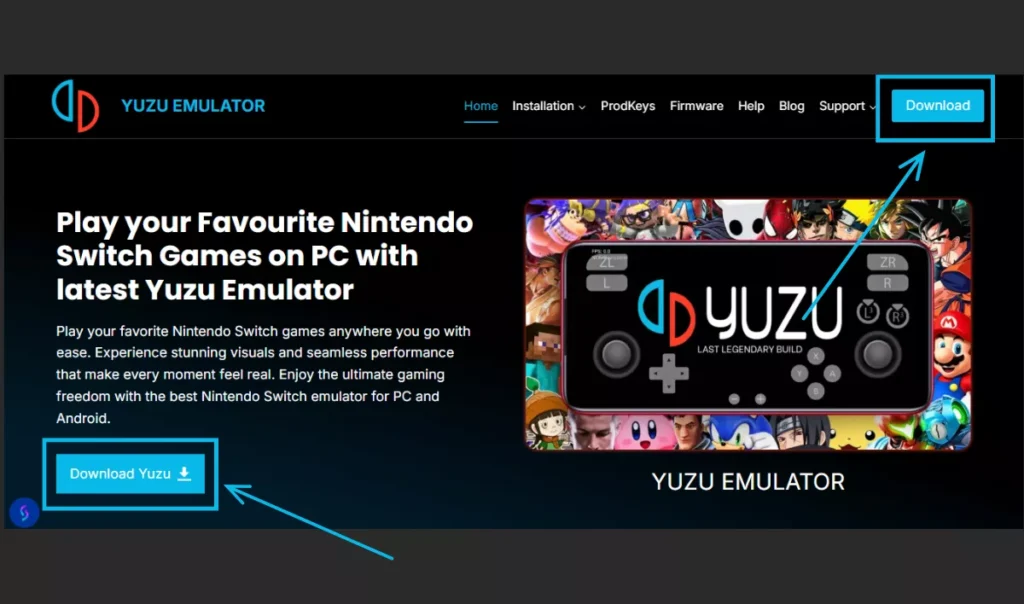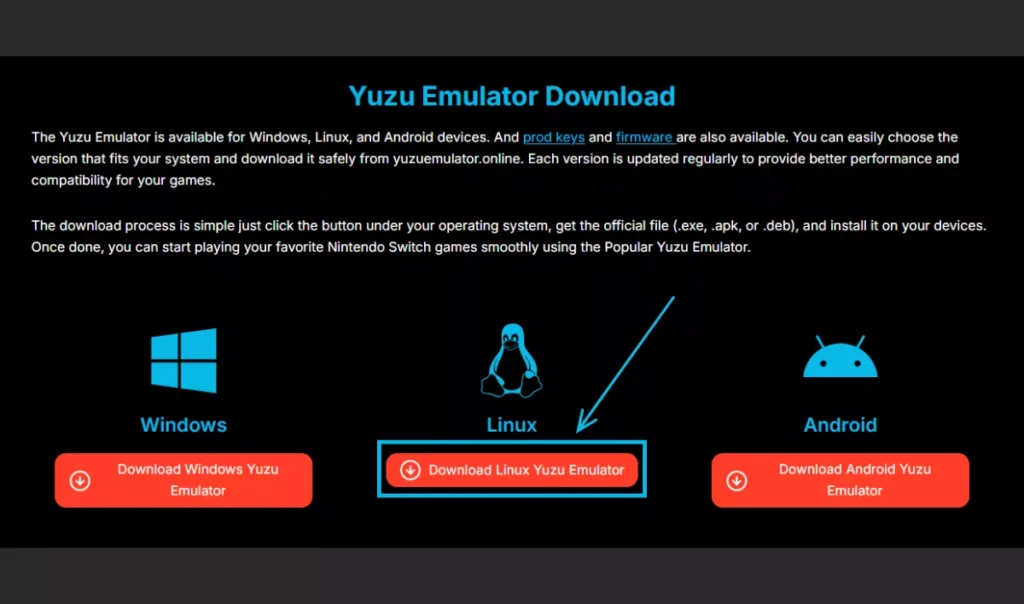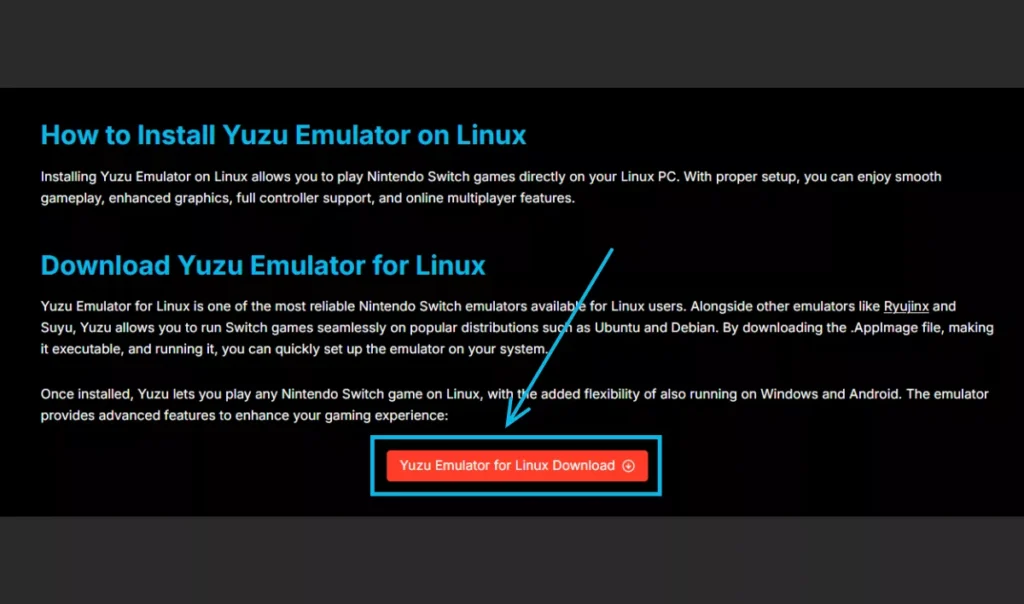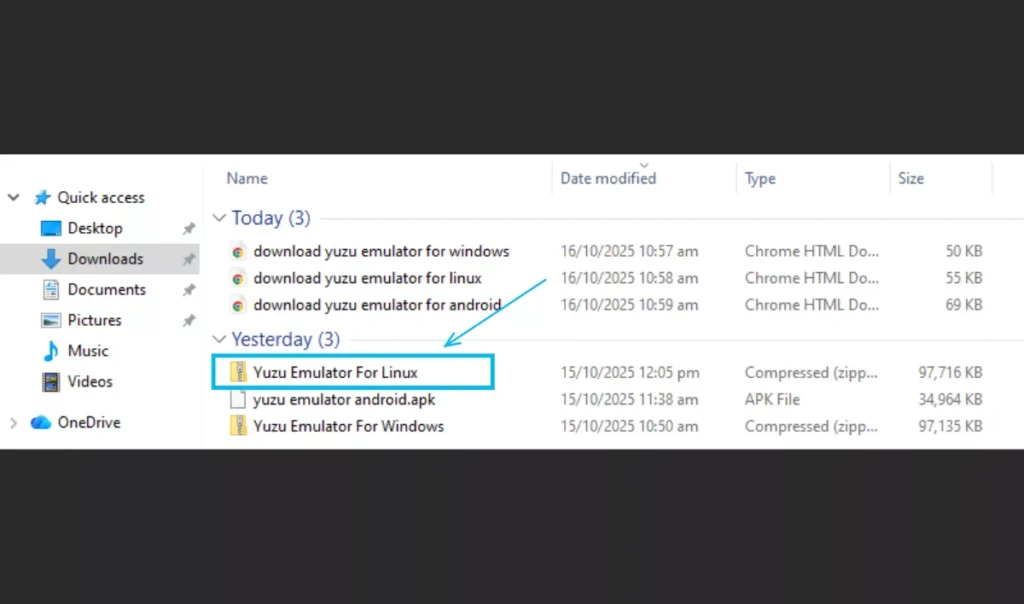How to Install Yuzu Emulator on Linux
Installing Yuzu Emulator on Linux allows you to play Nintendo Switch games directly on your Linux PC. With proper setup, you can enjoy smooth gameplay, enhanced graphics, full controller support, and online multiplayer features.
Download Yuzu Emulator for Linux
Yuzu Emulator for Linux is one of the most reliable Nintendo Switch emulators available for Linux users. Alongside other emulators like Ryujinx and Suyu, Yuzu allows you to run Switch games seamlessly on popular distributions such as Ubuntu and Debian. By downloading the .AppImage file, making it executable, and running it, you can quickly set up the emulator on your system.
Once installed, Yuzu lets you play any Nintendo Switch game on Linux, with the added flexibility of also running on Windows and Android. The emulator provides advanced features to enhance your gaming experience:
Step-by-step installation instructions are provided to make the setup process simple.
- Resolution scaling improves game clarity, making graphics sharper and more detailed.
- It play online with friends or join communities without needing extra tools.
- It export and import game saves to preserve your progress across devices.
- It supports both Vulkan and OpenGL for smoother performance and better visuals.
- It customize games with mods to enhance or personalize your experience.
- It is compatible with over 100 Nintendo Switch titles, from popular hits to indie favorites.
- It works with Xbox and PlayStation controllers for a console-like experience on Linux.
- The AppImage format allows Yuzu to run without installation, making it portable and lightweight.
- It runs well on Steam Deck devices, offering a portable gaming experience, even if unofficially.
Important Note: Yuzu Emulator cannot be legally distributed with Nintendo Switch files. Always ensure you use a trusted source and prodkeys and firmware.
|
File Name |
Linux-Yuzu-EA-4176.AppImage |
|---|---|
|
File Size |
64 MB |
|
Version |
4176 |
|
Developer |
Tropic Haze LLC |
|
Platforms |
Linux (Ubuntu, Debian, Arch, Fedora) |
|
Architecture |
x64 (64-bit) |
|
Release Date |
05 March 2024 |
Installing Yuzu Emulator on Linux
Installing Yuzu Emulator on Linux is simple and allows you to play Nintendo Switch games directly on your PC. You can set it up using either the AppImage or Flatpak method, both of which handle dependencies efficiently. AppImage is portable and lightweight, while Flatpak ensures all required libraries are included. Once installed, you can configure Yuzu and start enjoying your favorite Switch games on Linux.
System Requirements for Yuzu Emulator on Linux
Before installing Yuzu Emulator on Linux, it’s important to ensure your system meets the necessary hardware and software requirements. Having a compatible CPU, GPU, and sufficient RAM ensures smooth gameplay, prevents crashes, and allows you to enjoy games at higher resolutions without lag.
Minimum Requirements:
Recommended Requirements:
Pro Tip:
Keeping your GPU drivers updated and using a modern CPU/GPU combination improves frame rates, reduces crashes, and ensures that advanced features like Vulkan graphics, resolution scaling, and multiplayer work seamlessly.
How to Download and Install Yuzu Emulator on Linux
Installing Yuzu Emulator on Linux is simple and lets you enjoy Nintendo Switch games directly on your PC. You can download the emulator safely from Yuzu Emulator Online, which provides the latest Linux-compatible version.
Here’s a detailed, step-by-step guide to make it easy for you:
Step 1: Access the Download Page
Before you can install Yuzu, you need to get the correct setup file for Linux. Your website provides multiple ways to start the download, making it convenient for every user.
- After visiting Yuzu Emulator Online, you’ll notice a “Download” button in the header at the top of the page.
- Alternatively, you can scroll down to the hero section, where there is another “Download” button.

Clicking either button will take you to the Yuzu download page.
Step 2: Select Linux on the Download Page
The download page provides options for different platforms, such as Windows, Linux, and Android. It’s important to select the correct platform to avoid compatibility issues.
- On the download page, you will see three options for the operating system.
- Click on Linux to access the latest version of Yuzu for your system.

Once selected, you will be shown the .AppImage file or Flatpak option for Linux.
Step 3: Download the Linux Setup
Now that you have selected Linux, it’s time to download the emulator. Make sure to save it somewhere easy to find, like your Downloads folder.
- The Linux version will usually be named something like
Linux-Yuzu-EA-4176.AppImage. - Click the download link and wait for the file to fully download.


Tip: Always download from Yuzu Emulator Online to ensure you get the official, safe version of the emulator.
Step 4: Install Yuzu Using AppImage
The AppImage method is the most recommended for Linux because it is portable and does not require system-wide installation.
Before running the file, you need to make it executable.
- Navigate to your Downloads folder where the AppImage is saved.
- Right-click the file
Linux-Yuzu-EA-4176.AppImage→ Properties → Permissions → check “Allow executing file as program”. - Click Save.
After this, double-click the file or open Terminal and run:
cd ~/Downloads
chmod +x Linux-Yuzu-EA-4176.AppImage
./Linux-Yuzu-EA-4176.AppImage
Yuzu should now open, ready for configuration.
Step 5: Optional Installation via Flatpak
Some users may prefer Flatpak, which automatically installs all dependencies. This is helpful if your Linux distribution has missing libraries.
- Update your system first:
sudo apt update
sudo apt upgrade
2. Install Flatpak if it’s not present:
sudo apt install flatpak
3. Enable the Flathub repository:
flatpak remote-add –if-not-exists flathub https://flathub.org/repo/flathub.flatpakrepo
4. Install Yuzu via Flatpak:
flatpak install flathub org.yuzu_emu.yuzu
5. Launch Yuzu with:
flatpak run org.yuzu_emu.yuzu
Note: The Flatpak method may not work if the repository is unavailable, so AppImage remains the most reliable method.
Step 6: Verify Installation
After launching Yuzu, make sure everything is working before adding your games:
- The interface should open without any errors.
- You can now connect your Xbox or PlayStation controller and configure graphics settings.
- Next, add Nintendo Switch keys and firmware to run your games properly.
Common Issues and Fixes
Even after successful installation, some Linux users face small issues while running Yuzu. Here are the 4 most common ones, along with easy fixes you can try right away.
Yuzu Emulator Not Opening on Linux
If Yuzu doesn’t start or crashes immediately after launch, it’s often due to missing libraries or corrupted configuration files.
- Open Terminal and update your system using: sudo apt update && sudo apt upgrade
- Make sure all dependencies like Qt5, SDL2, and Vulkan drivers are installed.
- Delete Yuzu’s config folder (
~/.local/share/yuzu/) and relaunch a fresh one will be created automatically.
Black Screen While Launching Games
A common issue many users search for, the game loads but only shows a black screen.
- Switch between Vulkan and OpenGL in Yuzu settings.
- Delete shader cache from
~/.local/share/yuzu/shader/. - Update your GPU drivers.
- Restart Yuzu and try launching again.
Low FPS or Stuttering Gameplay
If games feel laggy or slow, the issue is usually related to performance settings or outdated drivers.
- Use Vulkan instead of OpenGL for better performance.
- enable Multicore CPU Emulation under “Emulation → Configure → CPU.”
- Close background apps to free system resources.
- Keep your graphics drivers up to date.
No Audio or Sound Crackling
Many users report that audio doesn’t play or sounds distorted in games.
- Go to Emulation → Configure → Audio and select Cubeb as the backend.
- Increase the Audio Buffer Size slightly for smoother sound.
- Restart Yuzu after changing audio settings.
Frequently Asked Questions
Here you’ll find answers to the most common questions about Yuzu Emulator on a Linux. From game compatibility and performance tips to controller setup, these FAQs help you get the best experience.
